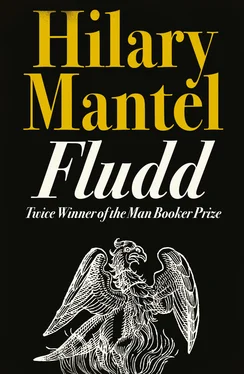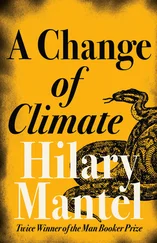Perpetua took a gay little step, arching her instep in the lace-up shoes. ‘Ah, but I’m interrupting you,’ she said.
I hope Agnes does not bring in tea, Father Angwin thought. I hope she does not take that upon herself. It would be encouraging Purpit. ‘Take a seat?’ he said. But Purpit continued her dance.
‘Can I believe the evidence of my ears?’ she asked. ‘Is it true that the bishop wants the statues disposed of?’
‘It is true.’
‘I always thought the church was cluttered. Not that it is for me to say.’
‘Not that it is for you to say,’ Father Angwin muttered.
Purpit flicked her veil back over her shoulder. ‘Do I also hear right? That you mean to bury them? Because what do you want, Father? Do you mean to have the village up here with wreaths? Or do you mean the congregation should just go on as normal and pretend that they are not buried and light their candles round the graves?’
‘It is you who say, graves. I have not said any other than “holes”. It is not a ceremony. It is not a rite. It is a measure.’ Hearing himself say this, Father Angwin found himself consoled a little. ‘A measure’ gave it distance, gave it dignity, gave it an air of calculation.
‘And when do you intend taking this measure?’
‘I thought of Saturday. To have the services of the Men’s Fellowship.’
‘Well, and I can lend you Sister Philomena. A fine strong girl. She can dig. A true daughter of the Irish soil.’
‘Oirish’, she said; it was her little joke. You cannot expect much of the humour of nuns. Purpit gave her hoarse horse laugh, and flicked her veil again. ‘I hear you’re threatened with a curate,’ she said.
Father Angwin noted her choice of word. He looked up. Between Mother Perpetua’s two front teeth, there was a gap; not an uncommon thing, but Father Angwin found that it attracted his eye. He thought of Mother Perpetua as a cannibal; and through that gap, in his imagination, she pulled and sucked the more tender bits of her victims. ‘Well, you never know,’ the nun said. ‘Fresh blood.’
The Saturday following was the day that Father Angwin had marked out for the interment; and he had chosen dusk, to draw a veil of decency over the indecent. The weather had cleared, and the declining sun gold-tipped the battlements; in the damp, moss-scented air, house-martins dipped and wheeled over the presbytery.
The Men’s Fellowship, when they were assembled in their ancient and greeny-black suits, wore an aspect of mourning. ‘I don’t know,’ Father Angwin said, ‘but would not corduroys have been more suitable?’ In all his years in the parish he had not reconciled himself to the strange and hybrid character of the place. He knew in his heart that they were clerks and millhands, that they had no corduroys, no woollen shirts, no rustic boots.
The married men, on the whole, eschewed the Fellowship. They came to church but once a year, and that at Easter or thereabouts; they left such business to their wives. But there were many bachelors in the parish, men of middle years for the most part, desiccated through abstinence and yellow through long devotion; clerics manqués, but most of them too humble or stupid to put themselves forward as candidates for ordination. The smell of mould arose from the speckled shoulders of their jackets, and, being hung about with holy medals, they clanked as they walked. Some of them, as he knew from the confessional, practised austerities: meagre diets, the denial of tobacco. He suspected much else: hair shirts, knotted-string scourges. Only supernumerary devotions could kindle their dull eyes. Each lived for the day when he might help an elderly nun across the road, or be nodded to by a monsignor.
The ground had been professionally prepared, for Father Angwin was not about to overtax or overestimate his crew. The gravedigger and his assistant had been called in from the cemetery that St Thomas Aquinas shared with the neighbouring parish; the Fetherhoughtonians did not merit a facility of their own. There had been a discussion (heated) in the church porch, and eventually, and after money had changed hands, the two craftsmen had seen the logic of the priest’s case. True, they were not employed to dig holes; it was not their vocation, it did not agree with them. For that he might better have employed, as one of them pointed out, a landscape gardener. But given that the holes were grave-shaped, it might be seen as trespassing on their speciality should he retain some other professional; and the holes need not be so deep as graves, so the work would be easy. They had conceded the point, and excavated the ground behind the garage.
When Father Angwin saw the holes he clasped his arms across his chest, hugging behind his soutane a nameless, floating anxiety; what he saw was a graveyard prepared for some coming massacre or atrocity, and he said to himself, as clever children always say, if God knows our ends, why cannot he prevent them, why is the world so full of malice and cruelty, why did God make it at all and give us free will if he knows already that some of us will destroy ourselves in exercising it? Then he remembered that he did not believe in God, and he went into the church to supervise the removal of the statues from their plinths.
Father Angwin had himself a good knowledge of the principles of levers and pulleys, but it was Sister Philomena who, by example, spurred the Men’s Fellowship on to the effort needed. By the time the statues were out of doors, and the men had coiled their ropes and picked up their shovels, the scent of her skin had seeped to them through her heavy black habit, and they edged away, their celibate frames shaken by what they did not understand. She was a big, healthy girl, in her woollen stockings. You were conscious of the smell of soap from her skin, of her eyebrows and of her feet, and of other parts you do not notice on nuns. It was possible to think of her having knees.
Sister Philomena lifted her skirts a fraction to kneel on the damp ground, watching intently as the saints were lowered into the earth. At the last moment she leant forward, and skimmed her rough housewife’s hand across the mane of St Jerome’s lion; then she eased herself back, settled on her haunches and drew the back of her hand across her eyes.
‘I liked him, Father,’ she said, looking up. He put out a hand to assist her; she rose smoothly and stood beside him, tipping back her head so that her veil dropped itself over her shoulder into its proper folds. Her hand was warm and steady, and he felt the slow beat of her pulse through the skin.
‘You are a good girl,’ he said. ‘A good girl. I could not have managed. I am too sad.’
Philomena raised her voice to the Men’s Fellowship, who were teetering and swaying one-legged, black flamingos, scraping off their shoes. ‘You all gentlemen should go to the Nissen hut now. Sister Anthony has got the tea urn out and is baking you some fruit-loaf.’
At this news, the men looked cast down. Sister Anthony, a rotund and beaming figure in her floury apron, was feared throughout the parish.
‘Poor old soul,’ Father Angwin said. ‘She means well. Think of the good sisters, they have to face it every day, breakfast dinner and tea. Do this last one thing for me, lads, and if it is very unpalatable, you must offer it up.’
‘There’s not more than a handful of grit in it,’ Philomena said, ‘though possibly more grit than currants. You can offer it up as Father says, make it an occasion of obtaining grace. Say “ Sacred Heart of Jesus, help me to eat this fruit-bread. ”’
‘Is that what you say?’ Father Angwin asked her. ‘I mean, mutatis mutandis, with suitable adaptation? For instance, I believe she burns the porridge?’
Читать дальше












